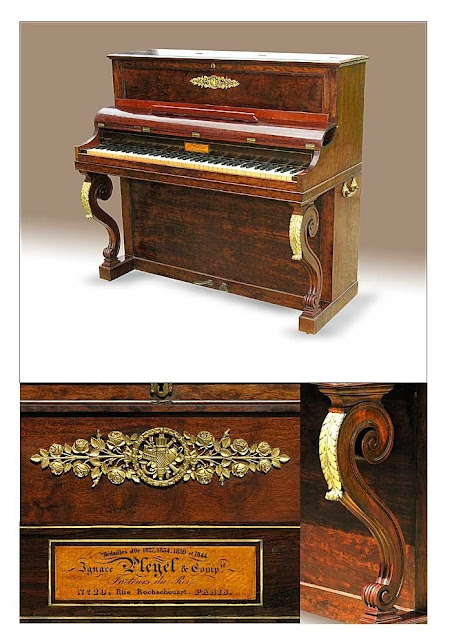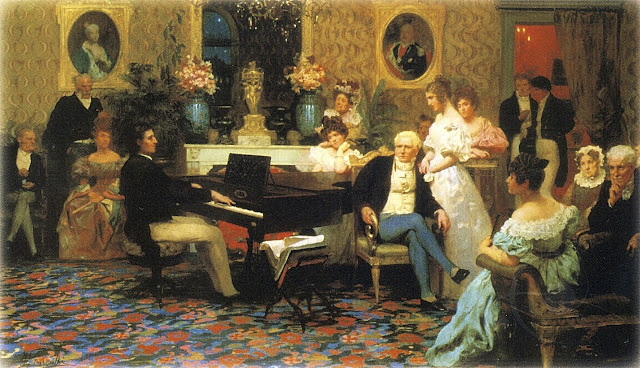My Pleyel pianino of 1844 No: 11151 - a few thoughts
I hope you will forgive a digression. The French pianist Yves Henry at the Nohant Chopin Festival each year, devotes his time during Masterclasses to the instructive comparison of the sound palette, touch, action and pedalling of Pleyel instruments with modern pianos. I have a few considerations of my own to offer.
The Pleyel pianinos are wonderful instruments, as Chopin understood and praised them. The ne plus ultra he termed them. In his lessons he demonstrated his musical interpretations to his pupils on one whilst they were seated at a concert grand Pleyel instrument. They are the perfect domestic instrument for the pianist who wishes to explore the authentic Chopin soundscape. They are inexpensive (restored at around €12,000), small with minimal maintenance and tuning, in compass capable of dealing with everything Chopin wrote, glorious in subtle tone, intimacy and even able to thunder in the restricted space of the average modern apartment.
 |
This is a detail from the famous picture Chopin's Polonaise - a Ball at the Hotel Lambert in Paris by Teofil Kwiatkowski (1809-1891) now in the National Museum Poznan. This palace (the Hotel Lambert) was the Parisian home of the Polish magnate Prince Adam Jerzy Czartoryski and a centre for the volatile discussions of the political 'Polish question' in the mid nineteenth century. There was an annual Polish Ball and in the painting Chopin is seen playing a small Pleyel pianino instrument when the artist could easily have depicted him seated at a far grander piano. These instruments were not played against a wall as uprights are today but wheeled into the open area of a drawing or ballroom thus freeing their marvellous sound. They were customarily equipped with ormolu handles on either side of the case and castors on the feet for the purpose. |
https://app.box.com/shared/kxdzfyhr60
Olejniczak inhabits what one of Chopin's favorite pupils, Princess Marcelina Czartoryska, perceptively called the climat de Chopin. He understands the potential of earlier instruments to give the music a dramatic yet poetic voice. The different colors given by Chopin to the registers written for the right and left hand are painted on clearly differentiated tonal planes, impossible to emulate on a registrally balanced and tonally homogeneous modern instrument. However, not all pianists trained on modern concert instruments have the sensitivity to transfer their digital dexterity and expression to the difficult single escapement mechanism of the Pleyel.
I feel he has retained the essentially Polish melancholy of this composer. The Etude erupts from the instrument with a potent anger sweeping all before it while the mazurka is a miracle of intimacy, poetry and tone colour. None of these sound qualities are any longer possible on modern instruments, however great the player. Even brilliant musicians can only resort to inspired approximations and brilliant over-pedaled fudges. It is the very limitations of the period instrument that adds so much to the subtle feminine intimacy and sudden contrast of a flaring of masculine anger so characteristic of the complex personality of this composer.
The completely physical and percussive treatment of the instrument in Chopin interpretation today is beginning to depress me inordinately. Many young pianists possess such fabulous technique that has required enormous work and personal life sacrifice to achieve. Why waste it thundering away? Is Chopin's music only to be offered up on the altar of egotistical virtuosic display, competition career building, pedagogical snobbery and monetary gain? 'Technique is money' a noted Asian musical academician and pianist once observed to me rather perceptively and depressingly at a Masterclass.
There is no relation between Chopin's fastidious personality and this deformed augmentation of his masculine side at the expense of the feminine side of his nature, a man who abhorred 'the exhalation of the crowd'. A curious reversal seems to have taken place from Chopin the composer for schoolgirls (his initial reception in England) to a Chopin who seems to be considered as only occasionally sensitive (particularly at night in Nocturnes), a violent revolutionary alpha male but with a soft side.
If one owns a Ferrari or Bugatti Veyron one does not drive it flat out all the time. However the tension lies in knowing that the reserve power is there even if not utilized. One can feel the presence of the reserve even at lower speeds. I feel that with the Steinway or Yamaha concert grand, it is much the same - the enormous bass of these instruments does not need to be pounded out in Chopin (unbalancing the piece) for the audience to be aware of the underlying immensity of the sound and its harmonic significance. For Prokofiev, Scriabin, Mussorgsky, Rachmaninoff and Liszt one might justifiably use the full resources of this giant percussive instrument effectively, even terrifyingly.
However in Chopin the restraint of passion is far more powerful than the full expression of everything one has in mind. Chopin understood this principle to perfection. 'I only indicate. It is up to the listener to complete the picture.' Why do not young pianists take this statement of his to heart? And naturally the teachers are riding the wave of the potential fame of their students, so they encourage this type of extreme, declamatory dynamic behaviour in Chopin. He was a great teacher himself and primarily concentrated on the production of a beautiful touch and tone with his students - these aspects of playing seem to be neglected in academies in favour of structure and technical facility.
Students should be encouraged to listen to Dinu Lipatti who places expressiveness, spirituality and musical poetry far above virtuoso display. Glenn Gould never counted himself among the pianists he amusingly and accurately categorized as 'a typical triceps terror'. Chopin used delicacy and refinement of touch coupled with a richness and fullness of tone when required, to avoid using the piano solely as a percussion instrument. Digital dexterity and power, however awesome, is no substitute for profound musical imagination.
All piano students should be required to at least try out pianos of the period for which the music they are performing was composed. Placing music in its proper full cultural and historical context in order to understand what the composer was trying to achieve gives it life. It is not the hand of deathly historicity. Beethoven sonatas are magnificent and fully realized in sound on the modern Steinway concert instrument in a large hall. However when performed on an instrument of his period in smaller salons, one can additionally feel the tremendous tension and excitement of this revolutionary composer trying to break through the sound restrictions of his limited instrument.
Students should be encouraged to listen to Dinu Lipatti who places expressiveness, spirituality and musical poetry far above virtuoso display. Glenn Gould never counted himself among the pianists he amusingly and accurately categorized as 'a typical triceps terror'. Chopin used delicacy and refinement of touch coupled with a richness and fullness of tone when required, to avoid using the piano solely as a percussion instrument. Digital dexterity and power, however awesome, is no substitute for profound musical imagination.
All piano students should be required to at least try out pianos of the period for which the music they are performing was composed. Placing music in its proper full cultural and historical context in order to understand what the composer was trying to achieve gives it life. It is not the hand of deathly historicity. Beethoven sonatas are magnificent and fully realized in sound on the modern Steinway concert instrument in a large hall. However when performed on an instrument of his period in smaller salons, one can additionally feel the tremendous tension and excitement of this revolutionary composer trying to break through the sound restrictions of his limited instrument.




Comments
Post a Comment